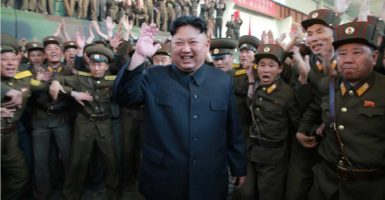President Donald Trump will speak again to the newly elected South Korean president—who during his campaign advocated more direct engagement with North Korean leader Kim Jong Un. That was before North Korea’s ballistic missile test over the weekend.
“There is no question that North Korea continues to threaten the United States,” @PressSec says.
Trump talked by phone to South Korean President Moon Jae-in on Wednesday, the same day the country’s liberal leader was sworn into office.
Asked if the administration will advise against South Korea’s engagement in light of the missile test, White House press secretary Sean Spicer declined to get ahead of Trump’s next conversation with the new leaders.
“The president looks forward to having a new conversation with the new president and discussing the way forward, but I’m not going to get ahead of him on that,” Spicer told The Daily Signal during the press briefing.
The test missile reportedly flew more than 430 miles and reached an altitude of 1,245 miles before landing in the sea between North Korea and Japan, demonstrating that it could be used to target U.S. military bases in the Pacific.
North Korea’s launch will be a “litmus test” for both Trump and Moon, Bruce Klingner, senior research fellow in Asian studies at The Heritage Foundation, told The Daily Signal in a phone interview.
On one front, Klingner wonders if Trump will get ahead of China in seeking more sanctions on North Korea.
“Trump has been effusive in his praise for China,” he said, but added, “China is doing less than meets the eye. So will Trump hold back on sanctions?”
He continued:
Moon wanted less sanctions and more engagement. North Korea, as with [U.S. President Barack] Obama in 2009, showed they will act no differently with a liberal progressive than they did with his conservative predecessor [President George W. Bush].
The missile test should prompt caution for South Korea’s peace ambitions, said Anthony Ruggiero, senior fellow at the Foundation for Defense of Democracies, a national security think tank.
“Governing is different than campaigning. North Korea also gets a vote. North Korea responded to Moon Jae-in’s outstretched hand with a ballasted missile test,” Ruggiero told The Daily Signal Monday.
Beyond sanctions, there are few diplomatic options to contain North Korea, and the United States will have to take the lead, Ruggiero said.
“China and Russia will not put the level of necessary pressure on North Korea, only the Trump administration [will],” he said. “This will not serve as a wake-up call for Russia.”
Over the weekend, Spicer issued a statement saying North Korea’s test missile hit close to Russia, and that “the president cannot imagine that Russia is pleased.” During the briefing, he again brought up the key United Nations Security Council member nations that haven’t been cooperative in pushing sanctions—China and Russia.
“There is no question that North Korea continues to threaten the United States, our allies, Japan, South Korea, and its neighbors, including both China and Russia,” Spicer said. “We are calling on all of those folks in the region, in particular, China and Russia, to do everything they can in terms of sanctions to help resolve the situation and bring stability to the peninsula.”
North Korea likely has the capacity for an electromagnetic pulse that could target the United States, said Clare Lopez, vice president for research and analysis the Center for Security Policy, a national security think tank. She said she doesn’t believe the U.S. civilian power grid could withstand such an attack if the regime is able to launch over the continental United States.
As for South Korean, Lopez said she believes the new government assuredly understands the threat.
“I can’t imagine the South Korean leadership is naïve about North Korea,” Lopez told The Daily Signal. “The new president might want to express a diplomatic ambition, but I can’t believe he is oblivious to the existential threat of the North.”



























